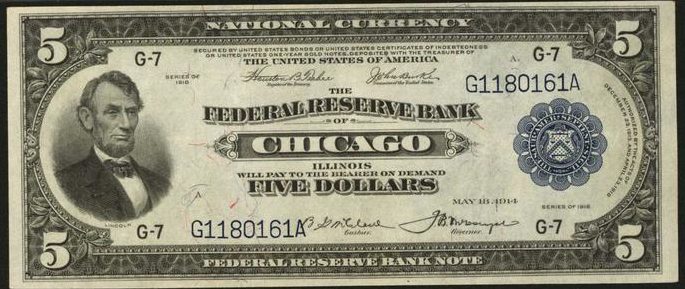Value of $5 National Currency From Series of 1918
| Year: 1918 | Type: Federal Reserve Bank Note | Denomination: Five Dollar Bill |
| Value: The value of five dollar 1918 federal reserve bank notes is based on condition and bank of issue. | ||
| We purchase $5 federal reserve notes from from 1918. Send us an email to tell us what you have admin@oldcurrencyvalues.com. We will respond quickly with our opinion and offer. | ||
| Description: Series of 1918 five dollar bills are not common, but they are also not especially value considering their rarity. Their design is very similar to many other notes. Because of this fact, they can get overlooked. Each 1918 $5 bill has Abraham Lincoln on the front of the bill.
The 1918 $5 federal reserve bank note pictured below is issued by Minneapolis. However, your exact note could be issued by any of the twelve districts (besides Richmond). If your series of 1918 $5 bill has a star symbol at the end of the serial number, it will command a premium. You can learn more about 1918 $5 star notes here. Star notes are rare for 1918.
|
||
| Variations: 1918 five dollar bills were only be signed by Teehee & Burke or Elliott & Burke on the treasury side. Each federal reserve bank also had signing officers on series of 1918 $5 bills.
Boston – Bullen, Morss In total there are about 25 different signature combinations for 1918 five dollar federal reserve bank notes. Several of these signature combinations are considered rare. Send us pictures of your note and we can check to see if you have a rare signature combination. |
||
| Inscriptions: National Currency – Federal Reserve Bank Note – Series of 1918 – May 18, 1914 – Secured By United States Certificates Of Indebtedness Or United States One-Year Gold Notes, Deposited With The Treasurer Of The United States Of America – Will Pay To The Bearer On Demand Five Dollars – Authorized By The Acts Of Dec. 23, 1913, And April 23, 1918 – Cashier – Governor – Register Of The Treasury – Treasurer Of The United States – Amer Septent Sigil Thesaur – This Note Is Receivable At Par In All Parts Of The United States In Payment Of All Taxes And Excises And All Other Dues To The United States Except Duties On Imports And Also For All Salaries And Other Debts And Demands Owing By The United States To Individuals Corporations And Associated Within The United States Except Interest On Public Debt | ||

